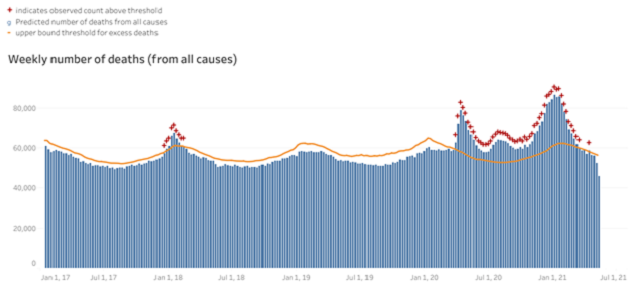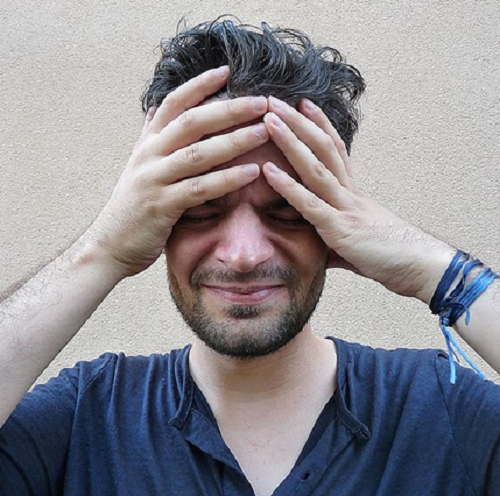
By Patrick Watson*
According to some analysts, inflation is coming soon. Americans will spend like crazy and drive prices higher as the pandemic recedes.
That’s the theory. It may be right, for a while, but we also have other problems. For one, the pandemic hasn’t ended; it’s simply become optional.
Most US adults can now “opt out” by getting vaccinated. The shots, while not perfect, are proving highly effective. Unfortunately, many are opting to stay vulnerable. We also can’t yet vaccinate children under 12.
This may be an economically significant problem soon. But even if the virus disappears, we are going to spend years repairing the economic damage already done… and more may be coming.
Excess deaths
Confirmed US COVID-19 deaths now exceed 600,000. These are people with positive tests. Some question whether they all died “from” the virus or simply “with” it. But whatever the cause, they are dead.
In normal conditions, population-level mortality is highly predictable. That’s why the life insurance industry works. “Excess deaths” above the expected number mean something unusual happened.
This chart from the CDC shows US deaths from all causes by week since 2017. When the blue bars go above the orange line, it means more people than expected died that week. It happened a few times in the unusually bad 2017─2018 flu season.

But starting in March 2020, COVID-19 generated excess deaths every week for almost an entire year. (Note: The recent weeks may be incomplete, since recording deaths takes a while.)
Of those excess deaths, some died directly from COVID-19 and others indirectly because, for instance, they couldn’t get necessary healthcare. Add up the excess deaths and the US seems to have lost more like a million extra people, not the 600,000 we can pin on the virus.
Human lives are an economic resource. All are producers and/or consumers. Researchers estimate the average victim died about nine years before they otherwise “should” have. That’s many years of life lost (YLL). David Kotok of Cumberland Advisors explained why this is important.
By the end of this calendar year, we project a COVID shock of about 10 million YLL in the United States. That is a huge reduction in projected aggregate demand, because consumption by those million people over their projected average 9 lost years disappears. That is an addition to the baseline projection from the mortality tables.
And I haven’t even touched on the issue of the skills lost. The 100-year-old person who died of COVID in a nursing home counts as a COVID death but makes only a small contribution to this economic estimate. The 30-year-old nurse who died of COVID while caring for COVID patients in a hospital, on the other hand, makes a large contribution to YLL and will be sorely missed, as will the 50-year-old engineer or computer scientist. So, too, the truck driver or teacher. COVID has killed many who are highly skilled, and it has killed many who had years yet to contribute to the labor force.
To be blunt, dead people stop being active participants in the economy. It’s no coincidence war-torn nations often face depressions afterward. Pandemics have a similar effect. This one’s numbers are big enough to matter, and more so in certain industries that depend on the most-affected groups.
But that’s not the only problem.

Source: Wikimedia.
Long-haulers
Most people who get COVID-19 survive, but sometimes with persistent health consequences. Scientists are still trying to understand this “Long COVID” condition. It can be serious.
Estimates suggest COVID disabilities will far outnumber COVID deaths. Eventually we may have treatments to help them, but for now it looks like a big problem. Here’s David Kotok again.
The evidence grows daily that there are something like six to eight long-haulers for each COVID death. That loss of health and capacity, too, is a demand shock. It also impacts the ability of the labor force to work since it leads to growing medical leaves of absence and disability. It also raises the demands on the healthcare sector. Millions more COVID long-haulers will need treatments and work accommodations if they are to be able to continue to contribute to the labor force.
Much more data needs to be gathered to enable us to quantify both the medical needs of COVID long-haulers and a figure capturing the weeks, months, or years of work lost to long COVID; but we do have enough input to know that the numbers will be significant.
A civilized society takes care of its disabled members, but doing so has costs.
Inflation needs fuel
All these effects are locked in based solely on what already happened. If the virus resurges, they may get worse.
Nor is this only a US problem. Excess deaths and long COVID are happening around the world. Countries without our advantages may experience even more harm, and take longer to recover from it.
So if your investment thesis assumes a sustained global boom as the virus fades, you might want to think again. Inflation needs fuel… and we already burned a lot of it.
COVID long-haulers will feel the effects for years. The economy will, too.
*Patrick Watson is senior economic analyst at Mauldin Economics. This article is from a regular Mauldin Economics series called Connecting the Dots. It first appeared here and is used by interest.co.nz with permission.
20 Comments
So a total of 10 million years of life lost equals about 10 days per person in the US.
An obese person can expect to lose 5 to 10 years of life expectancy.
A smoker 10 years.
A lifetime motorcyclist 4 months.
Interesting to look at it in that context.
I believe a report from Australia estimated 9 years lost for a type 2 diabetic patient.
Given that the vast majority of those decedent were aged, you could do a further assessment of acute medical costs from COVID-19 vs those not accrued by them living + superannuation payments saved. Purely a maths exercise before anyone bashes me as 'ageist.'
NZ can never open up to the world. Not unless Jacinda accepts that by her opening up the borders people will die. Which they will, even if 100% of the population are vaccinated. If the borders open the virus gets in and 95% eficacy means not everyone is protected by the vaccine.
What I see is a lot of public backing for the current quarantine requirements but I expect over coming months that will start to reverse as the remainder of the Anglosphere continues to head back towards normality.
You'll never get to 100% vaccination or avoid further Covid-19 deaths but New Zealand can allow everyone who wants one a vaccine prior to disbanding the MIQ system. Looking at government modelling that's November onwards:
https://www.health.govt.nz/our-work/diseases-and-conditions/covid-19-no…
As of 30th April, 101m people in the US were fully vaccinated against COVID. From 1st January to 30th April, there were 10,262 'breakthrough' infections recorded amongst people who were vaccinated. The numbers here aren't directly comparable, and the breakthrough infection rate will be an undercount, but very gross maths gives a rate of 0.01% infected over this time period.
Of the 10,262 who were infected post vaccination, 995 (10%) were hospitalised and 160 (1.56%) died, with 28 due to reasons unrelated to COVID-19. So you could consider it to be a COVID-related death rate of 0.000130693% amongst people who were vaccinated, over a 4 month period in the US when COVID was still spreading quite rampantly.
So the short answer is: if you don't want to die of COVID when the borders are opened, get vaccinated.
If we manage to get herd immunity in NZ (70-80% of adults coverage), then we should end up with very very low mortality from COVID once borders are opened, since those most at risk (elderly, those with comorbidities) should themselves be vaccinated, and COVID should have great difficulty in transmitting to them. Really the people who need to be most concerned are those who cannot have the vaccine due to other medical issues.
At the current rate of success, we might never actually all get vaccinated.........
This is an interesting addition to thinking re demand in next few years, which clearly is reduced.
A lot fewer rich consumers and 9 years average spending up in smoke (except of course they hand wealth on and its gets spent) Also all that long cv19 illness and inability to work. Likelihood of Japan, USA, EU, NZ and Australia getting to 2.5% GDP growth in next 3 years is looking more remote, esp given ageing pop and competition from rising powers in SE Asia.
9 years per person that died. So an average of only 10 days per head of population. My reading of that is the economic effect of covid deaths is actually minimal.
100%. The costs were associated with lockdown-wage subsidies etc. Human life has a value. It is used when different interventions are compared, for example should I spend $45million on funding a new targetted therapy for breast cancer, or invest the same amount for self screening of HPV to reduce cervical cancer. For every good additional year of life, some countries use a crude threshold of $50,00 per year (QALY-Quality Adjusted Life Year). The actual amount varies but it works for many OECD countries (NZ excl). In 10mins you can work out how much you might be prepared to pay (medical, societal costs etc) to limit COVID-19 if you make some assumptions around life years lost (how may years would you normally have expected that person to live without COVID-19). Do the maths, it is beyond absurd what NZ has spent.
Do the maths, it is beyond absurd what NZ has spent.
Only if you're working from a perspective of "the government could have chosen a different course of action that allowed COVID into the country, resulting in no more than X deaths and Y cases of long-COVID, which would have optimised our QALY investment for this pandemic".
Except no one has the ability to ensure deaths/complications are below X and Y, unless they go for an elimination approach.
Professor John Gibson - Waikato Uni. Very interesting watch...not sure why (but I can guess) why the man's not having more 'reach'.
Short version
https://www.youtube.com/watch?v=O2JOg4ki_so
Long version
Professor John Gibson – Economic policy, productivity and the global economy
https://www.youtube.com/watch?v=xhi0NsJ5yxY
Sad number of views as this includes an excellent summation of NZ response. And hes' sceptical.
Professor John Gobson makes the understatement of the century: "If we misperceive risk.. If we have a media that excessively focuses on one risk then we'll excessively invest in certain risks, and we pay more that we should for the health gains we could achieve" I'd go further and say that the government and media have flat out rejected any and all risk mitigation strategies that don’t involve complete lockdown.
Except when people die, any wealth they had is distributed amongst their inheritors. If they didn't have any wealth (in a nursing home or whatever), then they had practically no economic demand anyway.
In many cases spreading this inheritance out may stimulate more demand, as the common saying is that 'poor people spend all the money they get', and it can also be considered to be moving consumption that would have occurred over the next 9 years into the short term.
Even with vaccination, its only a matter of time before a vaccine resistant strain of the virus develops and spreads, and we will be right back at square one.
Given the mutations to date with COVID and other coronaviruses, it is likely that vaccines will be at least moderately effective against future variants.
The key thing about these vaccines is that they're very effective at preventing people needing to be hospitalised if they get infected with COVID. Variants are likely to increase how contagious the virus is, but if they don't make a huge difference to hospitalizations amongst those who are vaccinated, then they aren't really of too big a concern. As long as you get vaccinated.
In fact new research suggests that those who had a real COVID infection followed by a vaccination may be practically immune to future variants and may not need vaccine booster shots, whereas those who only had a vaccine may need to get booster shots to help deal with variants in the future: https://www.nytimes.com/2021/05/26/health/coronavirus-immunity-vaccines…
Clinical trials disagree. New England Journal of Medicine https://www.nejm.org/doi/full/10.1056/NEJMoa2102214. AZ vaccine using chimp adenovirus showed no efficacy against mild-moderate infection. The trial was not powered to assess severe infection and/or death. Brazil suspended use of 'Sputnik' due to sig issues with quality control including wildly varying amounts of antigen in commercial product vs that used in clin trials (the upscaling was a mess). Future immunity requires that the spike protein is continually recognized as 'foreign' to elicit an immune response. No guarantees there....Disclaimer-I'm pro-vaccine and have no issue with being vaccinated with the Pfizer vaccine.
1 clinical trial of 1 vaccine showed it did not prevent mild illness against 1 variant.
Production problems of the sputnik vaccine is not really relevant to how effective it is when produced properly.
Neither of these are relevant to what I said in my comment - which was about the vaccines protecting against severe and fatal infections from variants.
it will be a long covid recovery for the economy judging by the lack of progress in getting anywhere with the national vaccination,so far ineffectual.usual endless dicking around,mixed messages.lack of urgency.
NZ is being very slow in the rollout - See the country rollout rates here 6:21 min https://youtu.be/ZGoEa-dcF9I
Given that the new data shows that Pfizer BioNTech vaccine is stable in a standard freezer we could be going faster. It’s critical IMHO that NZ's borders are open before summer this year to prevent unnecessary economic damage.
Why this repetition of 'recovery'?
Who says that s a given?
https://ourfiniteworld.com/2021/05/27/dont-expect-the-world-economy-to-…

We welcome your comments below. If you are not already registered, please register to comment
Remember we welcome robust, respectful and insightful debate. We don't welcome abusive or defamatory comments and will de-register those repeatedly making such comments. Our current comment policy is here.